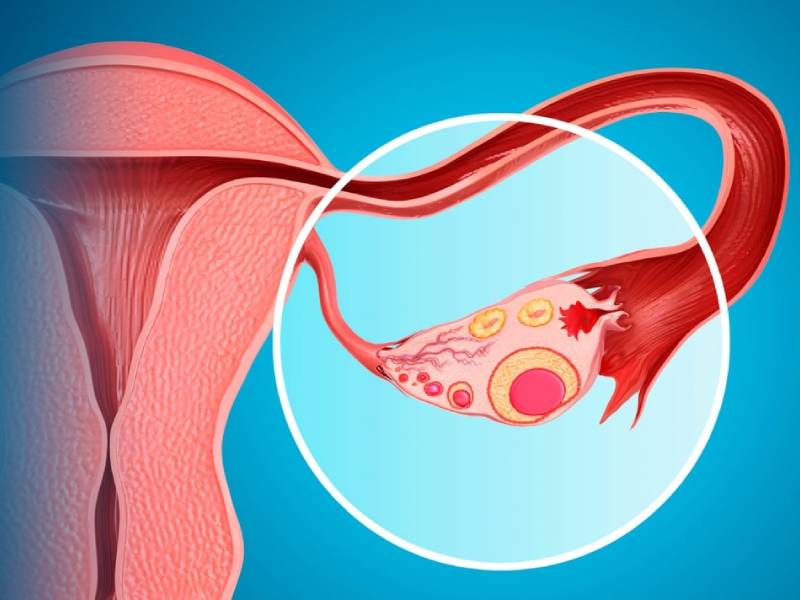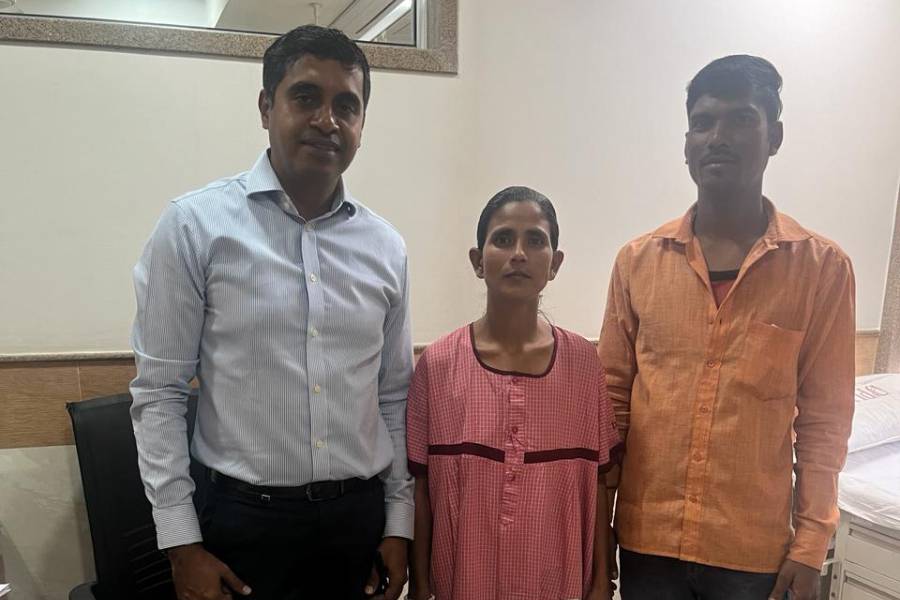Our Gynaecological Cancer Specialist in Pune at Cloverleaf Speciality Clinic Wakad, Pune provides compassionate care to patients confronting a range of malignancies primarily affecting the female reproductive organs. Dr. Manoj Dongare, with over 16+ years of experience, is ready to guide you through every step of your treatment.
Dr. Manoj Dongare is one of the best cancer specialist in Pune which handles each and every case with utmost care. In his surgical experience, he has performed many Gynecological cancer surgeries successfully. He is the best surgical oncologist in Pune.

If you or a loved one are experiencing any concerning symptoms or have risk factors for gynaecological cancers, do not hesitate to seek medical attention with Meet Dr. Manoj Dongare. He is a renowned specialist in liver disease and a skilled oncologist who offers expert care for women facing these challenging diagnoses, focusing on personalized treatment plans to address each patient’s needs.
What are Gynecological Cancers?
Gynecological cancer is a type of cancer that starts in a woman’s reproductive organs. It includes cancers of the ovaries, fallopian tubes, uterus, cervix, and Vagina. Gynecologic cancers are the most common type of cancer in women. This is the second most common malignancy in Indian women. Cancer can start almost anywhere in the body, which is made up of trillions of cells. Most cancers form because of DNA changes that cause cells to grow out of control and crowd out normal cells. Cancer is the abnormal growth of cells that have the ability to invade or spread to other parts of the body. Timely management of these cancers is crucial.
What are types of Gynecological Cancers?
types include:
- Ovarian Cancer: Originates in the ovaries, the reproductive organs that produce eggs and hormones. It is often diagnosed at a later stage due to its subtle early symptoms.
- Cervical Cancer: Begins in the cervix, the lower part of the uterus that connects to the vagina. It is commonly caused by persistent infection with certain strains of human papillomavirus (HPV).
- Endometrial Cancer: Also known as uterine cancer, it starts in the lining of the uterus (endometrium). It is the most common gynecological cancer in developed countries.
- Vulvar Cancer: A rare type of cancer that starts in the outer part of the female genitalia. It can be associated with HPV infection and other risk factors.
- Vaginal Cancer: Cancer that begins in the vagina, the muscular tube that connects the external genitalia to the uterus. It is relatively uncommon compared to other gynecological cancers.
What are the signs and symptoms of Gynecological cancer?
Dr. Manoj Dongare explains signs and symptoms are not the same for everyone, and each gynecologic cancer has its signs and symptoms.
- Unusual vaginal bleeding (especially between periods, after menopause, or after intercourse)
- Pelvic pain or discomfort
- Frequent urination or difficulty urinating
- Abdominal bloating or swelling
- Unexplained weight loss or gain
- Changes in bowel habits (constipation or diarrhea)
- Persistent fatigue
- Abnormal vaginal discharge
- Pain during intercourse
Early detection is key, so it’s important to consult a specialist like Dr. Manoj Dongare for regular screenings and checkups.
How is Gynecological cancer diagnosed?
If cancer is suspected, a Gynecological cancer Surgeon may order diagnostic imaging tests, including:
How is Gynecological cancer treated?
The Treatment of gynecological cancer depends on the type of cancer and how far it has spread. Treatments may include surgery, chemotherapy, and radiation. Women with gynecologic cancer often get more than one kind of treatment.
- Surgery: In this Procedure remove cancer tissue in an operation.
- Chemotherapy: Using special medicines to shrink or kill cancer. The drugs can be pills you take or medicines given in your veins, or sometimes both.
- Radiation: Using high-energy rays (similar to X-rays) to kill cancer.
Prevention:
There are many different types of gynecologic cancer, each with its own causes and risk factors. However, there are some steps you can take to reduce your risk of getting cancer.
- Healthy Diet and Lifestyle: Healthy diet and lifestyle can reduce the risk of gynecological cancer.
- Genetic Testing: There are many indications for genetic counselling and testing, and women should review their family history with their doctors on a regular basis to understand their own personal need for this.
- HPV Vaccine: The HPV vaccine has been a valuable tool in preventing cervical cancer. Reducing the rate of HPV will in turn reduce the incidence of cervical cancer.
What is the cost of Gynecological cancer Treatment in Pune?
Why Choose Dr. Manoj Dongare for Gynaecological Cancer Treatment in Pune?
Dr. Manoj Dongare is a leading gynecological oncology specialist in Pune, known for his expertise and compassionate care. he performed more than 2000+ cancer surgeries, 600 liver Transplants, and 300 Pancreatic Resections. Here’s why he’s a top choice for treating gynecological cancers:
- Expertise and Experience: Extensive training and years of dedicated service in gynecological oncology, utilizing the latest advancements in cancer care.
- Comprehensive Care: Holistic approach that includes medical, emotional, and psychological support tailored to each patient’s needs.
- Personalized Treatment Plans: Custom treatment strategies based on cancer type, stage, and patient preferences, enhancing effectiveness and outcomes.
- State-of-the-Art Facilities: Access to advanced imaging, surgical tools, and the latest chemotherapy and radiation therapies at leading hospitals.
- Multidisciplinary Team Approach: Collaboration with specialists in radiology, pathology, and oncology for coordinated, effective treatment.
- Patient-Centric Approach: Focus on patient comfort, clear communication, and support throughout the treatment process.
- Cutting-Edge Treatments: Offers access to the latest treatments and clinical trials, including new drugs, targeted therapies, and immunotherapies.
- Emphasis on Early Detection: Promotes regular screenings and preventative measures for early cancer detection and effective treatment planning.
- Positive Patient Outcomes: Proven track record of successful recoveries and improved quality of life, as reflected in patient feedback and testimonials.
- Cancer Treatment Under Government Schemes: Reasonable therapy options through various government schemes, such as MJPJAY, CGHS, ECHS, MPKAY, and the Dhanwantari Scheme.
Book an Appointment:
Dr. Manoj Dongare at Dr. D. Y. Patil Hospital and Research Center provides the best treatment for various Gynecological diseases and cancer in Pimpri Chinchwad Pune. For more information about our comprehensive treatment options, or to request an appointment with the best Surgical Oncologist in Pune call 09881379573 or Click on Book Appointment for online booking with your near hospital.
Recent Patient Case Study:
FAQ's:
What factors increase the risk of ganecological cancers?
Risk factors include age, family history of cancer, certain genetic mutations (e.g., BRCA1/2), smoking, and certain infections (e.g., HPV for cervical cancer).
Is genetic testing available for gynecological cancers?
Yes, genetic testing can help identify hereditary risk factors, particularly for ovarian and breast cancers.
What is the prognosis for gynecological cancers?
Prognosis depends on the cancer type, stage at diagnosis, and response to treatment. Early detection generally improves outcomes.
Are there any government schemes available for cancer treatment?
Contact Dr. Dongare’s clinic or the respective government scheme’s office for cancer treatment details.

